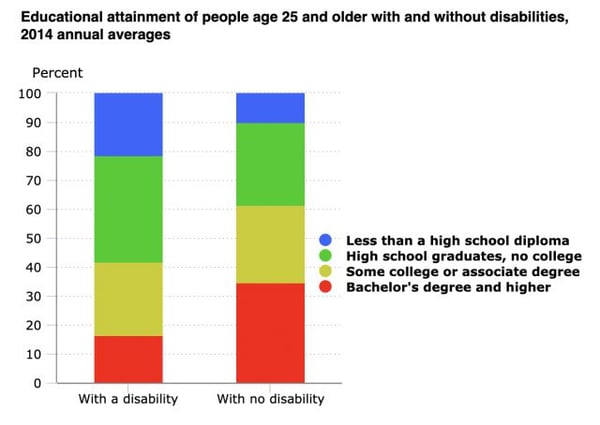Many students that enroll in either a four or two-year higher education institution do so with the intention of graduating within a certain number of years. Unfortunately, not all students that enroll in higher education make it to graduation. There are many challenges that face the average college student today and those challenges are doubled for students with disabilities. A 2015-16 report stated that 19 percent of undergraduate students reported having a disability and it’s safe to assume that that number has grown since the report was published. With so many students with disabilities, the path to graduation can sometimes be riddled with challenges.
One common challenge that students with disabilities face today is that they may lack the experience or confidence to advocate for themselves. The expectations and workload between high school and college are drastically different which emphasizes the need for students with disabilities to be able to ask for help and know how to submit accommodations requests. Although there are programs in place in which “federal law calls on schools to develop with students advocacy plans, which focuses on their strengths, preferences, and interest,” there was a study that found that “only 3 percent of students with disabilities in general education classrooms were specifically trained to speak and plan for themselves.” This leaves students with disabilities lacking the knowledge or tools to receive the accommodations they need in a higher education setting.
Another common challenge is that special education teachers may not have all of the training needed in order to deliver the best educational experience. In the article, Why Aren’t More Students With Disabilities Graduating On Time?, Sarah Butrymowicz and Jackie Mader wrote that “Few teacher education programs require more than one class on students with disabilities… And [teachers] aren’t always taught everything they need to know to handle the full range of disabilities they face in the classroom.” Additionally, some teachers will find it difficult to balance the responsibilities with teaching and the extensive federal paperwork. This results in students with disabilities feeling as though their education isn’t being properly handled.
All of these challenges can contribute to a decrease in retention of students with disabilities at their higher education institution. According to the United States Department of Labor, “people with a disability are less likely to have completed a bachelor’s degree than people with no disability.” These statistics specifically indicated that “Among people age 25 and older in 2014, 16.4 percent of people with a disability had completed at least a bachelor’s degree. By comparison, 34.6 percent of people with no disability had completed at least a bachelor’s degree.” Students with disabilities that aren’t able to have their need for accommodations met may feel more inclined to drop out than to not complete their bachelor’s degrees. Addressing these concerns is imperative to improving retention among students with disabilities.
 Graph provided by the United States Department of Labor
Graph provided by the United States Department of Labor
Symplicity Accommodate solves for these challenges by modernizing the accommodation request process and increasing efficiency of the disability services office overall. Accommodate is ADA-compliant and provides students with 24/7 access to a secure website that processes their requests confidentially without them having to visit an office. Accommodate also automates, simplifies, and tracks the approval and delivery of accommodations so staff members can see a full view of the resources being used by their students as well as what resources are needed in order to better serve the student population. By streamlining the accommodation request process, retention is increased because teachers and staff spend more time providing students with the resources they need to get their degree and graduate.
For those interested in learning more about Accommodate, schedule a conversation with us or email info@symplicity.com.


